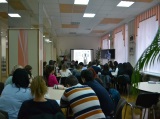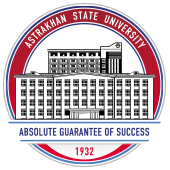Discussing Works by Michel Foucault at Philosophical Club of ASU
 22.11.2016
22.11.2016
A meeting of the Philosophical Club of ASU dedicated to the 90th anniversary of Michel Foucault took place at Astrakhan State University.
About 50 professors and students took part in the meeting, which was also held in honor of the International Day for Tolerance (November 16) and the World Philosophy Day (November 17).
Members of faculty staff of our Chair of Philosophy gave their reports about the famous French philosopher. In particular, Dr. Zoya Skolota told about the main stages of Foucault’s life and rich heritage. The issue of author in works by the great thinker was the main theme of the report given by Dr. Leonid Podvoyskiy, who wished our students rose from the level of “scripters” (i.e. people who just write) to the level of “authors” (i.e. people who create their own meaningful texts).
.jpg)
The problem of power analyzed by Foucault was reflected in the report by Dr. Igor Vostrikov. He emphasized the French philosopher’s idea that any discourse space is both a field for people to interact and a field for authority relations to take place. The methodological views presented in Foucault’s work “The Archaeology of Knowledge” were under detailed consideration in the report by Prof. Alexander Glazkov, Head of our Chair of Philosophy.
The report by Prof. Lyudmila Baeva, Dean of our Department of Social Communications, was of special interest for the event participants; it concerned the idea of “space of otherness” expressed by Foucault. She pointed out that according to the French philosopher, there are two types of space that are in special relations to other spaces. First, those are utopias – spaces that do not exist in reality and relate to the imaginable world; second, those are heterotopies as other spaces, where several heterogeneous places are combined, where the flow of time is specific, where particular cultural and historical contexts take place, where specific markers and in-and-out principles exist (e.g. theaters, libraries, carnivals, hospitals, prisons, cemeteries, museums, etc.). According to Prof. Baeva, the principle of heterotopia may efficiently be applied to research present-day realities, e.g. phenomena of electronic culture (the Internet, social networks, etc.).
In general, the discussed issues were of real interest for the meeting participants, who asked the speakers numerous questions, gave their comments and provided additional information.
The next meeting of the Philosophical Club of ASU (its date will be announced later) is to consider the Annales School.
.jpg)


